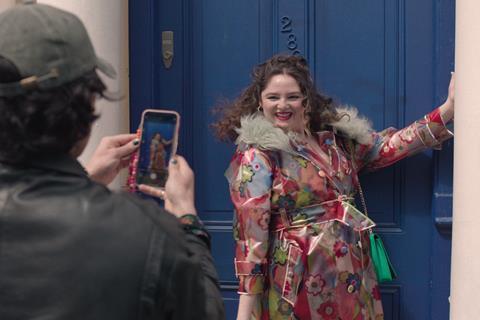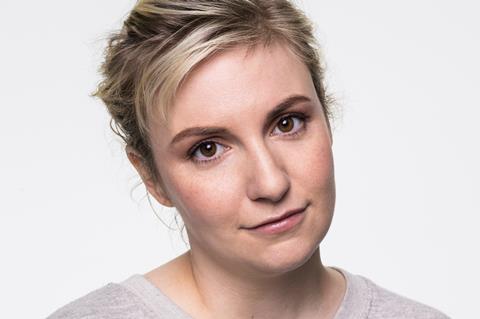As Lena Dunham enthusiastically reels off the various projects in the works following her recently announced Netflix deal, there is one which perhaps stands out as surprising – “a UK police procedural that has a bit of a twist to it”.

She refrains from diving into exactly what the twist might be, adding only that the show is “my ode to my love of Happy Valley and Prime Suspect, but with a little bit of my voice”.
Breathing new life into familiar concepts is a key creative driver for the US writer, actor and producer, she says, and it’s something which she set out to do with her first Netflix project under the pact, the UK-commissioned dramedy Too Much.

“I really love taking genres that feel well-worn and then seeing what we can inject into them,” she explains.
Dunham is speaking ahead of the Too Much premiere this week (10 July), with the next projects on the slate spanning romcom feature Good Sex with Natalie Portman, Mark Ruffalo, Tucker Pillsbury (aka Role Model), Meg Ryan and Rashida Jones – which she is directing; espionage drama Covers, on which she is writing, exec producing and helming under her Good Thing Going banner, teaming up with Yellowjackets’ Drew Comins and Fifth Season – “a spy show that’s also a college show”; and a “millennial teen show”, which feels very much in her wheelhouse.
While several projects are slated with Netflix in the US, the New York native – who now lives in London – is embracing her new local creative community wholeheartedly.
“I grew up in New York art world. I’m familiar with close, tight-knit creative communities that also have a commercial aspect, and I’ve spent a lot of time in LA. But what I love in the UK is the mixing of it all. It’s not like the filmmakers are over here, the artists are over there, and the fashion designers are over there,” she says.
“It feels, because it’s a smaller population, the creative people find each other and the intermixing I find really exciting. I never wanted to be in the kind of one-horse film town [like LA] where every coffee shop you walk into someone’s working on a screenplay. It’s really narrowing.”
On 10-part Too Much, which follows producer Jessica (Hacks’ Megan Stalter) striking out in London for work and (maybe) romance in the wake of a painful breakup, Dunham points out the show was devised from a “British hive mind”.
“I love the British television process because it’s so writer-focused and so individually tailored,” she says. “And I also feel like UK TV is now doing what we were getting to do on HBO in 2012, which are these novelistic, surprising shows.
“I’m watching [Paris Lees’ semi-autobiographical BBC drama] What It Feels Like for a Girl, which is so great and is so specific. It’s a show I feel might not get made in the US market right now. In fact, I know it wouldn’t get made.”
It is over a decade since Dunham burst onto the scene with her widely lauded – but also extensively criticised – HBO series Girls. The show met with opprobrium for its lack of diversity, which undercut the praise it received for its celebration of feminism, female relationships and messaging around body image and sexuality.
Through its flawed characters, Too Much bears similarities, but with a sensibility and style that reflects the monumental change TV and society has gone through since Girls ended in 2017.
The development of the streaming world, Dunham believes, has shaped her writing and allowed her to lean into character development in a different way to when she was creating digital series a decade ago.
“I had been an early web series maker, and I feel like we thought it was the future. It wasn’t quite; because those bitesize bits [of programming] didn’t allow people to connect to story,” she explains. “There were some great web shows, and it was a moment in time.
“But what it was really doing was predicting streaming and bingeing. We thought it was going to be a genre of its own and actually it was a bellwether, letting us know where things were headed.”
With digital platforms removing the concept of programming slots, Dunham says there is “something very freeing about this [streaming] culture”.
“It was an honour to have Girls as part of HBO’s Sunday night four shows, but at the same time, if somebody was frustrated with your show or felt like it didn’t belong in that lineup, they felt like something was almost being taken from them,” she says.
“They might think this is a half hour that could have gone to anything, so why do we have to watch these four girls giving hand-job energy?
“What I love about this moment is that if people need my show, they will find it. The audience that wants the show can engage with it, and it’s not thrust in front of the people who don’t.
“Streaming has created positive communities, so I felt even more comfortable going completely into my voice with Too Much.”
In doing so, Dunham is aided by episodes untethered from traditional runtimes, with dramas able to run from 35 minutes to feature film-length, and half-hour comedies dancing between 20 and 45 minutes.
“I’m always thinking the way in which a creative work is going to be consumed, whether it’s a film, essay, book or streaming show,” she explains. “And an interesting point about the phenomenon of binge watching is you don’t necessarily have to do a ‘last week on..’ summary.
“It allows for this kind of continuous stream of thought and deepening of character and world that I find really compelling.”
In one long scene in Too Much, Jessica and her British love interest Felix (Will Sharpe of The White Lotus fame) are watching Paddington on TV. He is, emotionally, explaining that despite it being a humourous kids and family film, it begins quite darkly. Jessica, meanwhile, is half-watching and responding with phatic feedback, while stalking the woman who is now with her ex-boyfriend on social media.
It is a familiar, poignant and potentially banal interaction, and it plays out without any dramatic intervention.
“My favourite episodes to write on Girls were bubble episodes – the ones where the characters disappeared into a universe,” Dunham points out. “You’re watching it as if you’re engaging with the episodes in a different way. If that was just a weekly chunk [of an episode on linear], it would feel like strange placeholder [for storytelling]. But here you can flow through it in a different way.”
To that end, Dunham praises Netflix execs for “encouraging me to follow my instincts and not asking for the traditional”.
“I was really allowed to just follow my bliss a little bit”, she ponders.
And she’s done so, with some hand-job energy thrown in along the way.
This story first appeared on Screen’s sister site Broadcast.















![[L-R]: Amanda Villavieja, Laia Casanovas, Yasmina Praderas](https://d1nslcd7m2225b.cloudfront.net/Pictures/274x183/6/4/1/1471641_pxl_20251224_103354743_618426_crop.jpg)









No comments yet